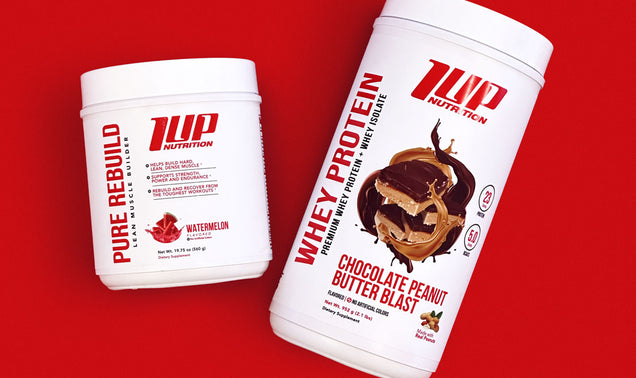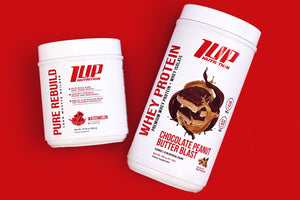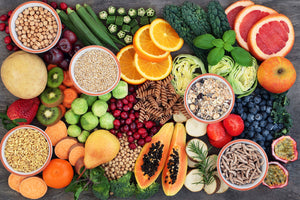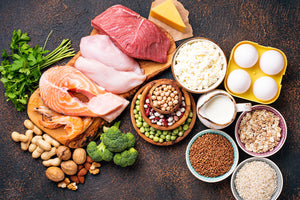Carbohydrates have taken an unfair beating in recent times, especially if you listen to the diatribe spewed from the low-carb/keto/carnivore acolytes.
But, the truth is that not all carbohydrates are bad. In fact, certain carbohydrates are incredibly healthful, such as fruits, vegetables, and whole grains.
Be that as it may, there remains a litany of myths and misconceptions surrounding carbohydrates.
Today, we debunk 8 of the most common myths surrounding carbohydrates, specifically in regards to their impact on weight loss.
Top 8 Carb Myths Debunked
#1 Eating Carbohydrates Prevents Fat Loss
No doubt you’ve heard that in order to lose weight, you “must” ditch carbohydrates. This harkens back to the whole “insulin hypothesis” which states that because carbohydrates cause a rise in insulin levels, they by default prevent the body from burning fat.
While it is true that when insulin levels are elevated the body is in an “energy storing” mode, the insulin hypothesis ignores what happens during the rest of the time that insulin levels are not elevated.
Furthermore, let’s say that you are in an energy deficit (calories in < calories out), your body is forced to burn stored body fat for energy to make up for the energy it is not getting from your food intake.
What’s more, carbohydrates rich in fiber, like fruits and veggies, and actually help keep you feeling fuller between meals, helping you stick to your diet and ultimately lose weight.
#2 Eating Carbs Causes Fat Gain
Taking the previous point one step further, some individuals and “gurus” will lead you to believe that not only do carbohydrates prevent you from losing fat but they’ll actually cause you to gain fat, serving a double-whammy of epic proportions to your transformation challenge goals.
Referencing the example from above, this myth simply doesn’t hold water.
The main driver of fat loss at the end of the day is calories in versus calories out. So as long as you’re in a deficit, even if your entire diet consists of nothing but ding-dongs, ho-ho’s, and bon-bons, you’ll lose weight.
(Now, the “quality” of the weight loss may not be the best -- meaning you’ll lose some muscle AND fat -- but you will certainly lose weight if you are in a calorie deficit.)
Moreover, carbohydrates are the body’s preferred source of energy, which means it will turn to carbohydrates first for energy, then stored body fat, and finally protein (muscle).
Additionally, converting carbohydrates into stored body fat is a very energy intensive (and inefficient) process for the human body.
For instance, when there is an excess of carbohydrates (glucose) in the body,
- First, the body increases metabolic rate enough to oxidize (“burn”) them for energy.
- Second, the excess carbs will be stored as glycogen in muscle tissue or the liver to be used throughout the day, including during your workouts
- Once glycogen stores are full and there is no immediate need for glucose, only then does the body begin the process of de novo lipogenesis (fat storage), which involves breaking down the carbohydrates and converting them into fatty acids. This process also involves energy (calories)
Essentially, carbohydrates are not easily stored as fat. It is an inefficient and metabolically expensive process for the body as such it will do that only as a last resort.
Finally, remember this...carbohydrates do not inherently cause fat gain...an excess intake of calories does. Quite often the “carbohydrates” that are blamed for fat gain (cookies, cake, candy bars, etc.) have just as much (if not more) grams of fat as they do carbohydrates).
#3 All Carbs Are Just Sugar
This misconception comes from individuals who have oversimplified and taken out of context what carbohydrates are and how they function in the body.
Yes, it is true that at the molecular level, all carbohydrates -- fruit, veggies, candy, popcorn -- are a collection of sugar molecules.
However, it’s overly reductive to say that an apple is the same as a bunch of gummy bears.
The apple contains carbohydrates, but it also has fiber (which helps to keep you feeling full), water, and a variety of essential vitamins and minerals which support metabolism and overall health.
#4 Carbs Aren’t Needed Pre- or Post-Workout
When it comes to nutrient timing, many of us (including those of us that eat carbs regularly) tend to prioritize the intake of protein around training. The quintessential example is a whey protein shake (such as our delicious-tasting 1UP Whey protein) consumed right after the workout is over to stop muscle breakdown and kickstart the recovery process.
But, carbohydrates also play an important role, not only in performance but recovery and growth too.
Carbohydrates supply your body with the preferred energy it needs (glucose) for high intensity exercise like resistance training, interval training, sprinting, etc. Following training, carbohydrates also help stop muscle breakdown, replenish glycogen, and support a greater anabolic environment, which helps recovery and growth!
An ideal pre or post-workout meal, especially for those on a time-crunch as well as those who don’t like to eat a big meal before or after training, is to mix together a serving of Tri-Carb and a scoop of 1UP Protein powder. This easy-to-fix meal is fast-digesting, easy on the stomach and contains everything the body needs to crush a hard workout and/or recover from one!
#5 Carbs Are “Bad” for Health
This simply isn’t true, no matter which way you try to spin it.
Carbohydrates contain water, fiber, and a bounty of essential vitamins, minerals, antioxidants, and polyphenols that are known to support human health as well as athletic performance and weight loss.
Fiber in particular is known to support gut health and cardio-metabolic health, by helping to support optimal cholesterol levels as well as stable blood sugars.
Remember, carbohydrates do not inherently cause fat gain -- an excess intake of calories coupled with a lack of physical activity does.
#6 Carbohydrates Are Addictive
We can’t tell you how many times we’ve heard this myth.
But, again, it rings hollow. Carbohydrates are not addictive.
Sure, individuals say they’re “addicted” to things like pizza, pasta, chips, cookies, candy, etc.
But, those foods are just made of carbohydrates...they’re a complex combination of fat, sugar, and salt. Moreover, most processed foods are specifically engineered to tantalize your taste buds and stimulate receptors in your brain to keep you coming back for me.
It’s not the carbohydrates by themselves that are addictive, it is the insidious combination of fat, sugar, and salt that keeps people going back to the feedbag.
Don’t believe us?
Just try sitting down and eating a bowl of pure sugar by itself or an entire bunch of bananas or a sack of potatoes by themselves. No other flavoring, additives, salts, spices, sweeteners, etc. You’ll soon realize that those foods are not addictive.
#7 Carbohydrates Do NOT Support Gut Health
This couldn’t be further from the truth.
The billions and billions of microbes that reside in your gut depend on the fiber in carbohydrates for energy.
While our bodies cannot digest fiber, the beneficial bacteria in our gut do, and if they’re not fed properly, they start turning to other sources for food and/or dying off, neither of which bodes well for the health and integrity of your GI system.
The bottom line here is that carbohydrates not only play an important role in keeping your mind, muscles and internal organs fueled, but they also keep the gut bacteria happy and healthy.
For added fiber and digestive health support, check out 1UP Fiber+ which contains 8 grams of natural dietary fiber as well as probiotics.
#8 Cutting Carbs = MORE Fat Loss
By eliminating carbs, many individuals believe they will become “fat adapted” and purely burn fat all day and night. And, that’s true to a certain extent. If you deprive the body of glucose (its preferred source of fuel), it has no choice but to either burn fat or protein (i.e. muscle) for energy.
However, simply because your body is “burning fat” doesn’t mean you’re actually losing weight.
Remember, in order to lose weight you must be in a calorie deficit. Without an energy deficit, it doesn’t matter how “fat adapted” you are, you won’t lose weight.
Plus, the truth is that during the majority of the day your body is primarily running on fat anyway! After a meal or during intense exercise you’ll be burning a higher percentage of energy from carbohydrates, but outside of those times your body is fueled by fat...even without you ditching carbohydrates!
Takeaway
Carbohydrates have taken an unfair beating in recent years, in large part by individuals looking to sell you on some kind of hokey diet.
The truth is that you can still eat carbohydrates (every day!) and lose weight. Carbohydrates are nutritional powerhouses rich in vitamins, minerals, and antioxidants, and they also contain fiber which helps keep you feeling fuller for longer, thereby sticking to your diet plan.
At the end of the day, weight loss is dictated by calores in vs calories out, whether you’re eating carbs or not.
If you want to be able to have your carbs and still lose weight, the best thing to do is track your nutrition, which is extremely easy to do with the FREE 1UP Fitness App.
Available on iOS and Google Play, the 1UP FItness App is your hub for all things health, fitness, nutrition, training and supplementation.
We provide customized calorie and macronutrient targets based on your age, sex, bodyweight, lifestyle and training goals. Also included is the ability to enter what foods you eat as well as select ones from our comprehensive food database. We’ve even have coach recommendations on what you can eat to hit your macro targets for the day if you’re not sure what to have.
Our goal with the 1UP FItness App is to eliminate the stress and guesswork of training, eating, and supplementation to streamline the process of getting results so that you can have the body you want without feeling like you’re living in the gym!






